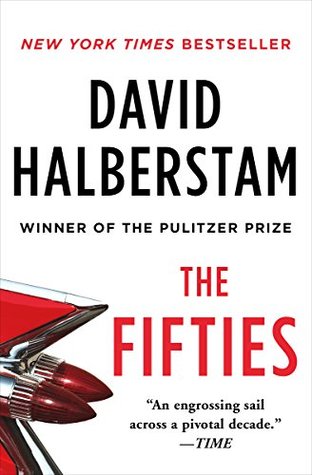More on this book
Community
Kindle Notes & Highlights
He certainly never wanted to be President, but thanks to the considerable muscle of the machine, he slipped into Washington as a senator and soon thereafter, somewhat to his own surprise, was given the 1944 vice-presidential nomination. Then a few months after his inauguration, Roosevelt died and he became the accidental President.
As development of the hydrogen bomb proceeded, someone asked Albert Einstein, whose original equations had paved the way to the atomic age, how the Third World War would be fought. Einstein answered glumly that he had no idea what kind of weapons would be used in the Third World War, but he could assure the questioner that the war after that would be fought with stones.
McCarthyism crystallized and politicized the anxieties of a nation living in a dangerous new era. He took people who were at the worst guilty of political naïveté and accused them of treason. He set out to do the unthinkable, and it turned out to be surprisingly thinkable.
Eleven years after McCarthy’s censure by the Senate, Lyndon Johnson would talk to his closest political aides about the McCarthy days, of how Truman lost China and then the Congress and the White House, and how, by God, Johnson was not going to be the President who lost Vietnam and then the Congress and the White House.
Two young engineers, John Mauchly and Pres Eckert, created the first working computer, ENIAC, or Electronic Numerical Integrator and Computer, at the Moore School of the University of Pennsylvania, primarily for the military and for the Aberdeen Proving Grounds, where it would chart ballistic trajectories.
The response seemed to divide along party lines. Representative Dewey Short, a Missouri Republican, said afterward, “We saw a great hunk of God in the flesh, and we heard the voice of God.” To former president Herbert Hoover, MacArthur was “the reincarnation of Saint Paul into a great General of the Army who came out of the East.” Truman, typically, was blunter: “It was nothing but a bunch of damn bullshit.”
Administration officials had few moral qualms either about their role or about deceiving the American press and people. They saw themselves in an apocalyptic struggle with Communism in which normal rules of fair play did not apply.
The national security complex became, in the Eisenhower years, a fast-growing apparatus to allow us to do in secret what we could not do in the open.
Gunnar Myrdal’s An American Dilemma, a devastating indictment of segregation, was published in 1944. Myrdal revealed the terrible fiction of separate-but-equal facilities: The Southern states were spending twice as much to educate white children as they were black children and four times as much for school facilities; white teacher salaries were 30 percent higher; and there was virtually no transportation for black children to and from school.
Frankfurter, a conservative who nevertheless was convinced that segregation had to end, foresaw a decision that would end segregation, but only by a five-to-four vote. Such a narrow margin would make implementation difficult, if not impossible. As a delaying tactic, Frankfurter suggested rehearing the arguments. The new hearings were scheduled for December 1953, but in September Vinson suddenly died of a heart attack. “This is the first indication I have ever had that there is a God,” said Frankfurter.
The murder of Emmett Till and the trial of the two men accused of murdering him became the first great media event of the civil rights movement.
THE SUPREME COURT RULING on Brown v. Board of Education, which occurred in the middle of the decade, was the first important break between the older, more staid America that existed at the start of the era and the new, fast-paced, tumultuous America that saw the decade’s end. The second was Elvis Presley.
One reason that Americans as a people became nostalgic about the fifties more than twenty-five years later was not so much that life was better in the fifties (though in some ways it was), but because at the time it had been portrayed so idyllically on television.
Elvis Presley’s success had been genuine: The young had understood that he was theirs, and television had been forced in the person of Ed Sullivan to capitulate, however reluctantly, and to accept him. In effect, the establishment had fought the coming of Elvis and fought his success; in the case of Ricky, it was the reverse. He was the artificial invention of conventional middle-class taste makers in a show that conventional Americans loved; his success therefore threatened no one. If anything, it seemed to sanitize rock.
In Peyton Place, Toth pointed out, the women who depend too greatly on men lose out, while the women who are independent are winners.
For the first time, the government began to pay attention to the auto industry and the impact of its decisions on the people of the nation. The legacy of the Corvair was that it connected the fifties to the sixties.
Until that night in Chicago, Kennedy had been the upstart, a little-known junior senator who had hardly bothered to take the Senate seriously. Nixon, on the other hand, had been Vice-President for eight years; he was experienced, had visited endless foreign countries and met with all the leaders of the world.


